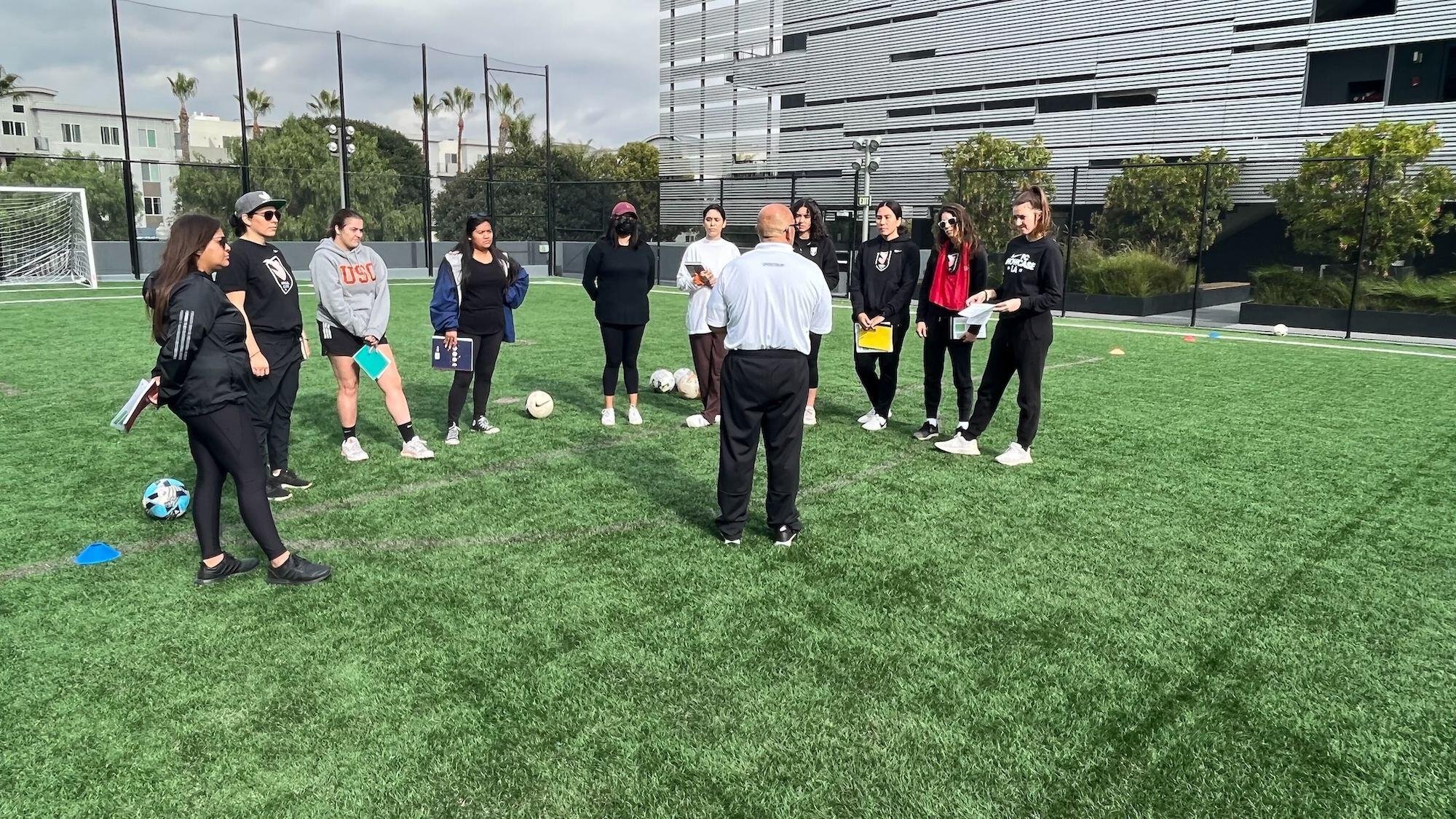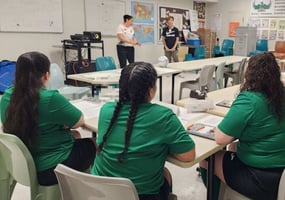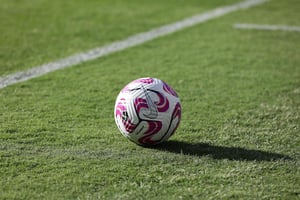Last week, a group of incarcerated women at the Century Regional Detention Facility gathered for...
The 10% Model: Education

Since Title IX became law 50 years ago, girls’ participation in sports has increased more than 1000%. As of 2019, 43% of high school athletes were girls, according to an NCAA report. But despite that massive increase in participation among athletes, a major gender gap still exists within the ranks of coaches, including in girls’ and women’s sports.
According to ESPN, as of February 2022, the US Soccer Federation had issued 140,000 coaching licenses to men, but only 31,500 to women, and the disparity only grows as you move up the coaching ranks. Just three women have received the top coaching certification USSF offers, the Pro License, compared with 57 men (three others, including Angel City Head Coach Freya Coombe, started the course this week).
As part of the Education pillar of its 10% impact model, Angel City is partnering with the CalSouth Foundation to change that.
Last weekend, 10 non-male-identifying coaches earned their USSF 11v11 Grassroots Coaching Licenses after completing an in-person course and an online course. The course was administered by CalSouth, a nonprofit that works on creating field space and other access issues, using USSF curriculum. That training was made possible by a grant from Angel City, in partnership with Gatorade.
“This is something that gives them a fundamental understanding of coaching and running a session with the emphasis on the 11v11,” says Jordan Schweitzer, executive director of the CalSouth Foundation. (Instead of age groups, the USSF coaching curriculum is based on the number of players on the field, with each category corresponding to an age group; 11v11 is for players between 13 and 19.)
Danielle Hanson, a participant last weekend who had already taken the 4v4 through 9v9 courses online, says an in-person course offered a new dimension. “I just found it helpful to be in person with the players,” she says. “To continue doing my best to feel comfortable in those spaces with players that maybe you've never met before, and to continue learning to bring your energy and your positivity.”
Hanson says one highlight was the guidance the instructor gave on freezing plays—where a coach has the team stop playing during a drill or scrimmage in order to teach a tactical or technical point. “Oftentimes with my team and coaching, I freeze it and then forget where I was going with it,” she says. “He gave us a structure of freezing and then taking them back two or three steps before that moment.”
The kind of support for coaching education offered by Angel City and CalSouth is invaluable for women and gender-expansive people, especially those who also belong to other marginalized groups.
“The soccer model here in the US can sometimes be tricky to navigate, especially if you don't have the financial means,” says Schweitzer. “If you participate in soccer in a pickup or community setting, but not necessarily in a competitive model, there's sometimes a lack of knowledge of what access is even around you,” he explains. Having the support of an organization like CalSouth, which has been working to broaden access to soccer in the area since 1999, can be a game changer.
So, too, is taking the course with other women and gender-nonconforming people. “The first thing I noticed getting to the field was it was all female coaches,” Hanson remembers. Hanson, who has been coaching since the summer—an opportunity she found through a “neighbor” at ACFC games—says that was a new experience. “I’m one of two women at the fields at John Adams Middle School, where I coach—where there are seven to ten teams practicing at a time.”
One effect of that gender imbalance, Hanson says, is a tokenization of the women who are involved. “Just in the short amount of time that I've been in the space, I've been approached by the head of a high school team to come on board with them next season,” she says.
It’s flattering to be offered a job, but he’d never met Hanson or seen her coach, and she couldn’t shake the feeling that he was interested only because of her gender, not her qualifications. “It's kind of a red flag, because it's like you're just looking at me going, ‘Female! In!’ and maybe not willing to actually hear what I have to say.” As more women and nonbinary coaches earn qualifications and join the coaching ranks, hopefully, that will begin to change.
With the first course completed, CalSouth will continue to support the new coaches by connecting them with coaching opportunities and other soccer organizations in their communities. The participants come from many different backgrounds and all have different reasons for wanting to coach. “Whether it's something that they're doing to support a family member or their community,” says Schweitzer, “or if it's something that they're looking to chase into their next career or to find a job through coaching, those are all things we want to support.”
For Hanson, the next steps will include continuing down the licensure path with USSF. She plans to sign up for the D License course as soon as it becomes available, alongside continuing to coach at her current club, AYSO United. “I'm actually taking on that team as head coach in the upcoming season,” she says. “I want to keep furthering my education and understanding of things like session planning, and hopefully talking to more coaches and players at a higher level.”
Hanson is in it for the long haul, and eventually hopes to coach at a collegiate level. Thanks to support from Angel City and CalSouth, she’s one step closer.
.png?width=75&height=114&name=ACFC_Crest_Primary_Sol%20Rosa%20(1).png)


